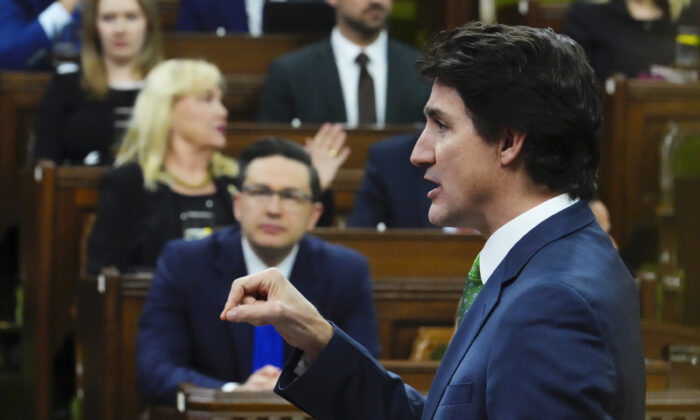Canada Is on ‘Race Toward Financial Shipwreck’: Montreal Economic Institute
The government’s gross debt has increased by 50 percent while the federal Liberal Party has been in power, representing $47,179 per Canadian, according to a new report by the Montreal Economic Institute (MEI).
An Economic Note published April 18 by the MEI, an independent public policy think tank, indicates Canada’s total gross debt, referring to all of the federal government’s debts and unfunded financial commitments, was over $1.8 trillion as of March 31, 2022.
In April 2015, Justin Trudeau said that if voters put their trust in him, he would balance the budget as of the very first year of his term, the note states. By December 2015, the newly elected prime minister backtracked and said it would take four years to return to a balanced budget.
“Since then, the federal government has regularly made headlines because of its extraordinary propensity to spend, its annual failures to eradicate the deficit, and the explosive growth of the debt,” says the note.
“Except for one year when it shrank slightly, the gross debt has been growing constantly since 2008, and that growth has accelerated since 2016,” said Nathalie Elgrably-Lévy, senior economist at the MEI.
“Yet money doesn’t seem to be a constraint for Ottawa. This government’s obsession with putting everything on the credit card is particularly worrisome.”
According to the note, “even before the COVID-19 pandemic, the federal government had embraced deficits, with increases in spending having outpaced revenue increases since the Trudeau government took office.”
MEI explains some of the consequences of a rising level of government debt: fewer funds for helping vulnerable citizens, the slowing down of economic growth, burdening a younger generation with old debt, upward pressure on interest rates, and lack of budgetary flexibility the government could need in an emergency.
The budget tabled on March 28 showed deficits for the next four years will be higher than projected, and by 2028 the deficit will hit a new high of $14 billion, not the $4.5 billion surplus the feds announced in November 2022.
According to the MEI, the debt has grown faster than the population. “Today the federal government welcomes each newborn by attributing them a debt of $47,179,” said the note.
The MEI suggests that even the pandemic—“an exceptional occurrence that could justify extraordinary expenditures” and indebtedness—“cannot explain the rapid deterioration of federal public finances since the Trudeau government’s first term.”
MEI said Canada is on a “race toward financial shipwreck” and needs to not only slow the growth of spending but quickly and significantly reduce the size of government.
“If pragmatic, effective measures are not taken today, we will surely face more painful decisions tomorrow,” the note said.

